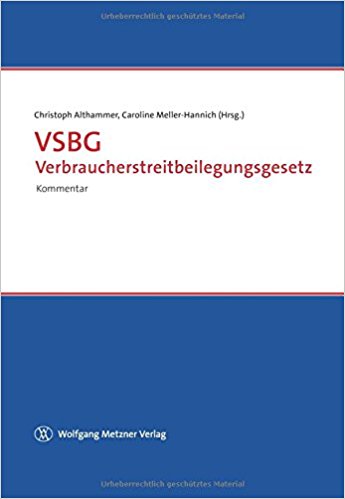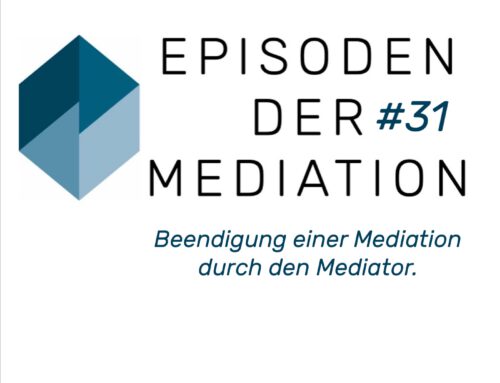The mediation dispute within the meaning of the VSBG – 5 Special features
§ 18 is the reason why the
V e r b r a u c h e r s t r e i t b e i l e g u n g s g e s e t z
(VSBG for short) is not only suitable for a game of "hangman" with a guaranteed win, but also as a topic for this blog post. The provision is interesting for us because it clarifies that Consumer arbitration centres can also conduct mediations to settle consumer disputes. In addition, Section 18 VSBG stipulates that the provisions of the German Mediation Act (MediationsG) are generally applicable to such mediations.
As we have already shown in the legal commentary by Althammer/Meller-Hannichis at the centre of a question that is not easy to answer:
If this is a "pure“ or better general Mediation within the meaning of the MediationsG or a "special“ mediation, enriched by consumer law is. That would then be a Mediation in the VSBG context?

Mediation in the VSBG context? General mediation or mediation enriched by consumer law within the meaning of the VSBG?
The title of this article already suggests that there are special features that need to be taken into account in VSBG mediation. The most important ones are outlined below.

1) No free choice of third party
The first difference is obvious. In § 18 VSBG § Section 2 (1) Mediation Act ("The parties select the mediator.") is the only provision that has been declared inapplicable. In contrast to mediation (outside the VSBG, but in accordance with the MediationsG), the parties are therefore not free to decide who conducts the mediation. Instead, the competence of the consumer arbitration board and thus of the respective mediator is determined by the law itself (§§ 6 para. 1 in conjunction with. § 4 VSBG).
However, this does not mean that the mediation centres cannot provide several mediators to choose from. It is not without a clever ulterior motive that the mediating parties have a free choice in a "pure" mediation pursuant to Section 2 (1) Mediation Act. Experience shows that mediations and their results are more sustainable if the parties can choose the third person on their own responsibility.
2) Requirements for the mediator
Special requirements with regard to the qualification of a mediator working in mediation are as follows § Section 6 (2) sentence 2 VSBG. Accordingly, only persons who are "qualified to hold judicial office or are certified mediators" may conduct VSBG mediation.
However, this does not mean that fully qualified lawyers (=“qualification to hold judicial office“) are allowed to mediate. The following applies to them via § 18 VSBG § Section 5 (1) Mediation ActThey must have successfully completed mediation training (they do not have to be certified in accordance with Section 5 (2) Mediation Act).
As the "certified mediator" will only exist once the corresponding regulation (ZMediatAusbV, Sept. 2017) comes into force, only the Fully qualified lawyer with mediation training conduct mediation within the meaning of § 18 VSBG.
3) The requirement of consumer rights-orientated mediation
If one considers the legislative concept and the specific setting of VSBG mediation, a further, decisive special feature becomes apparent: the desired solution to the consumer dispute should be orientated towards (consumer) law.
Consumer law is the guideline for dispute resolution in the VSBG – also in mediation!
Arbitration centres are intended to settle consumer disputes that are primarily based on (good) consumer rights. And as quickly as possible. The fact that the legislator by no means wanted to ignore legal aspects is evident in various places:
- The provision of Section 18 VSBG is closely related to the ADR Directive (Alternative Dispute Resolution). The recitals state: "Member States shall ensure that ADR entities are able to resolve disputes between consumers and traders [...]. with due regard to the rights of the parties enclose."
- A corresponding legislative mandate can also be derived from the qualification requirements for the mediator. For example, even a certified mediator can only conduct VSBG mediation if they have "legal knowledge, particularly in consumer law".
However, the requirement for consumer rights-orientated mediation also has an influence on the Mediation style.
(You can find a detailed article on the individual mediation styles here.)
The Boundary between arbitration and mediation, which cannot always be clearly defined, is likely to become particularly blurred in the case of mediation in the VSBG context. The distinction is usually made primarily on the basis of the purpose of the proceedings. In conciliation, the focus is on the specific proposed solution.
What about VSBG mediation? According to the view outlined above, VSBG mediation should actively focus on consumer law. The expectations of the parties to the dispute will be set accordingly. More than in "traditional" mediation, the co-operation of the mediator working in the dispute is likely to be important. This will be in the form of (legally sound, i.e. consumer law-orientated) solution proposals and ideas. By means of a corresponding agreement between the parties - because such cooperation on the part of the VSBG mediator cannot be expected without further ado - the procedure nevertheless retains the character of a ("evaluative") Mediation.
4) Right to be heard
§ 17 VSBG grants the parties right to be heardwhereas you will search in vain for a corresponding provision in the Mediation Act. But what is to be done in the case of mediation within the meaning of Section 18 VSBG? Is there also a right to a fair hearing here, to which "the procedural primal right of man"? Based on the legal situation and in view of the legislative will…"Yes, mediation in the VSBG context obliges to grant the right to be heard". But admittedly, not everyone sees it that way. But why do we see it that way?
The provisions of the Mediation Act are (for mediations in the context of the VSBG) supplementary to be used. In our opinion, however, this does not mean that the provisions of the VSBG are to be completely disregarded. The provisions of the VSBG remain applicable.
However, this does not apply without restriction. This is because the express provisions of the VSBG may conflict with the express provisions of the Mediation Act. In this case, the Mediation Act generally takes precedence (but see No. 5 below!).
However, such a collision case is not relevant here. Because there is No prohibition of a right to be heard in mediation. If mediants want to talk about the law in mediation, they must also talk about it. Therefore, there is no conflict between a mandatory provision (VSBG) and a prohibition provision (MediationsG). Rather, the mandatory provision of the VSBG supplements the provisions of the Mediation Act, so that a fair hearing must be granted in the case of VSBG mediation.
The granting of the right to be heard is not required by law in the context of mediation, but is required in the context of VSBG mediation: § 17 VSBG.
In our opinion, the possible objection that in mediation the parties determine what is discussed does not lead to a different result. The law does not require that only consumer law is discussed and therefore does not prohibit other topics. The law merely requires that special attention be paid to the legal framework (in comparison to general mediation within the meaning of the Mediation Act). No less, but also no more.
5) The third party in VSBG mediation
However, there is a real conflict between the VSBG and the Mediation Act elsewhere. According to § 13 para. 1 VSBG the parties may be represented by third parties - including lawyers - in dispute resolution proceedings (conciliation and mediation). Within the scope of application of the MediationsG (§ 2 para. 4), however, third parties can only be involved if all parties have given their consent.
Regulation against regulation.
But which one will prevail if mediation is conducted in accordance with the VSBG? According to the above-mentioned idea, the provision of the Mediation Act is likely to prevail.
A definitive answer or confirmation can be found in European law, specifically in the two directives. The ADR Directive provides for a corresponding right of legal representation (cf. Art. 8 lit. b). The Mediation Directive, for its part, does not require the other party to consent to the involvement of their own lawyer. European law is therefore more lawyer-friendly, allowing the involvement of „fourth parties“ even against the will of the conflicting party, etc. Based on the ADR guidelines, Section 13 VSBG therefore overrides Section 2 (4) Mediation Act.
The result: Lawyers can always be present and participate in consumer law-orientated mediations, regardless of whether the other party (or the mediator!) wants this or not. This once again emphasises the legislative intention to conduct mediation in accordance with Section 18 VSBG in a consumer law-oriented manner.
In a VSBG mediation, anyone may take a lawyer with them, even against the will of the other party.
5 Special features of VSBG mediation – also for the VSBG mediator
What becomes clear: Mediation in accordance with § 18 VSBG is not "pure" mediation within the meaning of the Mediation Act. In our opinion, the VSBG context cannot simply be ignored if the legislative mandate of the VSBG is to be taken seriously.
Of course, this finding also has a concrete impact on the work of the VSBG-Mediators out. Preference is given to a evaluative mediation style his particular attention to the Consumer protection rights is due.
Whether and how successfully the method of mediation in consumer disputes will be accepted in practice in the future cannot be predicted. In view of the special circumstances, too much euphoria in this regard is probably not appropriate. In contrast to "traditional" mediation, VSBG mediation is generally less concerned with failed social communication. The interests and factual situation will regularly be different. The consumer's motivation to explore the social, interpersonal, etc. aspects of the other party is likely to be rather low. Companies, on the other hand, are likely to be more interested in avoiding negative publicity and customer dissatisfaction.
On the other hand, who can say in advance where exactly the true interests lie? Mediation always means being open to Surprises.
And if, at the end of the day, positive experiences with out-of-court consumer arbitration raise awareness of alternative forms of conflict resolution overall, that can't be such a bad thing. Sooner or later, (traditional) mediation should also benefit from this. § In our opinion, Section 18 VSBG is therefore not a wolf in sheep's clothing, a deceptive package or legislative ineptitude, but rather an initial legal differentiation of the mediation instruments as regulated in principle in the Mediation Act in 2012.
However, we are aware that the provisions of Section 18 VSBG are controversial and can also be understood, interpreted and interpreted differently with good reason. We would therefore like to expressly invite you to use the comments section as an opportunity for in-depth discussion, exchange and criticism. We would be delighted!
Sascha Weigel and Nikolas Vogel





Leave A Comment